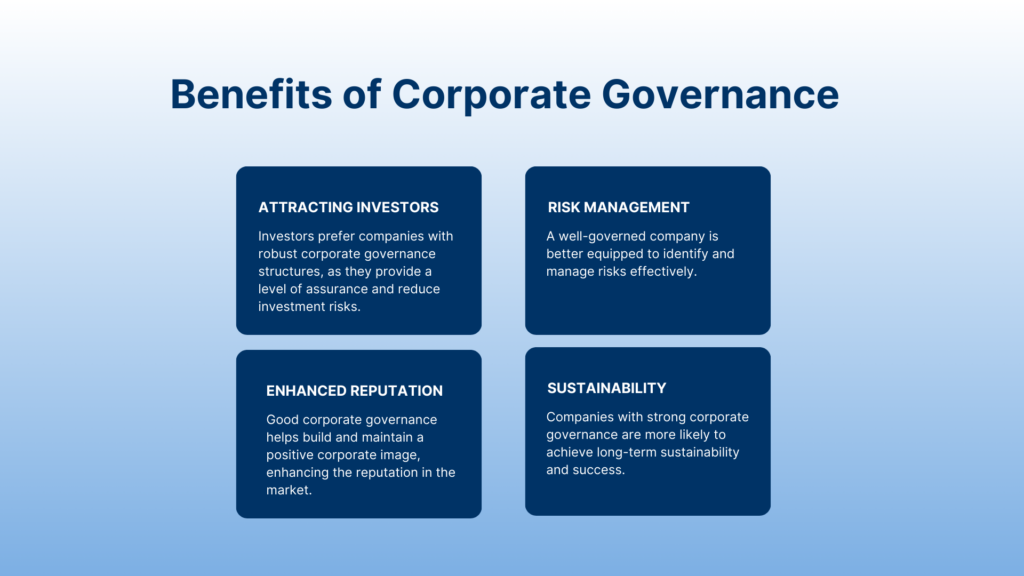In the world of business, corporate governance is an essential concept that plays a crucial role in shaping the success and sustainability of organizations. It encompasses a set of principles, processes, and practices that guide how a company is directed and controlled. In this blog post, we will delve into the significance of corporate governance, its foundational elements, the benefits it brings, and a glimpse into its future.
Why Corporate Governance is Important?
Corporate Governance is the set of rules, practices, and processes by which a company is directed and controlled. It is the framework that defines the rights and responsibilities of different stakeholders, such as shareholders, management, customers, suppliers, financiers, government, and the community. The primary objective of Corporate Governance is to ensure transparency, fairness, accountability, and sound ethical practices within an organization.
Accountability and Transparency
Corporate governance ensures that organizations operate with transparency and accountability. It requires companies to disclose information about their financial performance, operations, and decision-making processes. This transparency builds trust among investors and stakeholders.
Ethical Conduct
Good corporate governance promotes ethical behavior within a company. It sets the tone for integrity in decision-making, preventing unethical practices that could harm the company’s reputation.
Efficient Operations
Efficient governance structures improve decision-making processes and enhance operational efficiency. This, in turn, leads to better financial performance and sustainable growth.
Risk Management
Corporate governance frameworks include risk management practices, helping companies identify and mitigate potential risks effectively.
Types of Corporate Governance
Internal Corporate Governance:
This involves the mechanisms, rules, and processes within a company that oversees its operations. Key components include the board of directors, management, and internal controls.
External Corporate Governance:
External governance mechanisms are provided by external stakeholders, such as auditors, regulators, and industry associations. These entities ensure that the company operates ethically and transparently.
State-Owned Enterprises (SOEs) Governance:
This type of governance applies specifically to government-owned companies. It focuses on balancing the interests of the government, the public, and shareholders while ensuring efficiency and accountability.
Family-Owned Business Governance:
Family-owned businesses often have unique governance challenges. They need to balance family interests with the interests of the business and other stakeholders. Establishing clear rules and structures is crucial in such cases.
Nonprofit Governance:
Nonprofit organizations have their own governance models, with a focus on fulfilling their missions, ensuring financial transparency, and maintaining the trust of donors and the public.

Future of Corporate Governance
The future of corporate governance is dynamic, as it adapts to changes in the business environment, technology, and societal expectations. Here are some trends to watch for:
Technology Integration:
Technology will continue to play a significant role in corporate governance, with the adoption of AI and blockchain for enhanced transparency and accountability.
ESG Focus:
Environmental, Social, and Governance (ESG) considerations will gain prominence, with companies focusing on sustainability and social responsibility.
Stakeholder Engagement:
Companies will increasingly involve a broader range of stakeholders in decision-making processes, not just shareholders.
Global Standards:
Globalization will drive the convergence of corporate governance standards, making it easier for international investors to assess companies.
Keytake Away
Corporate governance is a fundamental aspect of modern business that cannot be overlooked. Its importance lies in promoting transparency, accountability, ethical conduct, and efficiency within organizations. By implementing strong governance structures, companies can reap the benefits of attracting investors, enhancing their reputation, and ensuring long-term sustainability. As we move forward, the future of corporate governance will continue to evolve, guided by technological advancements, ESG considerations, stakeholder engagement, and global standards.







